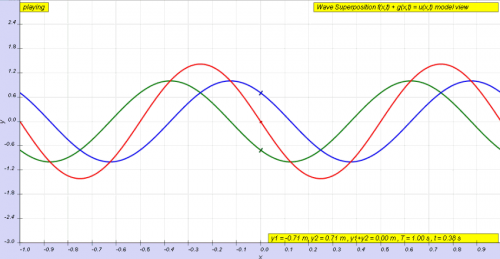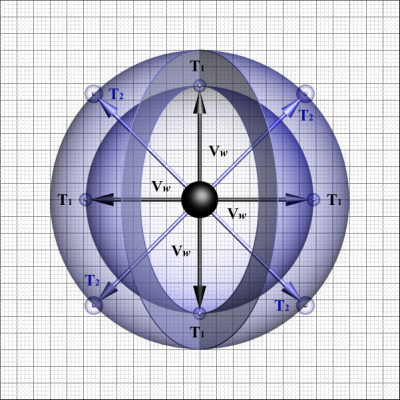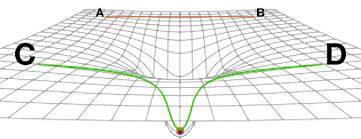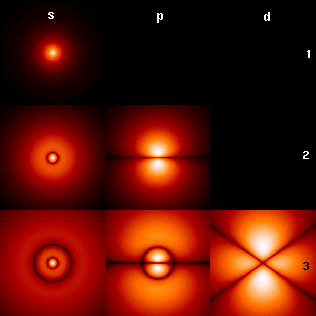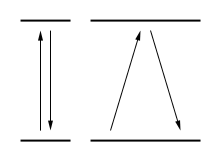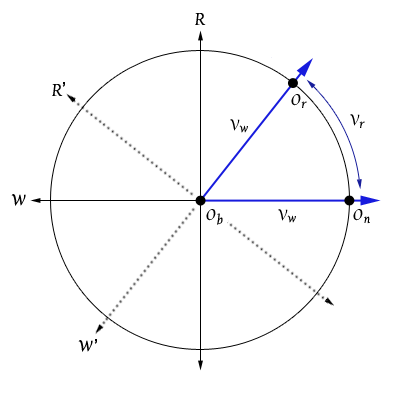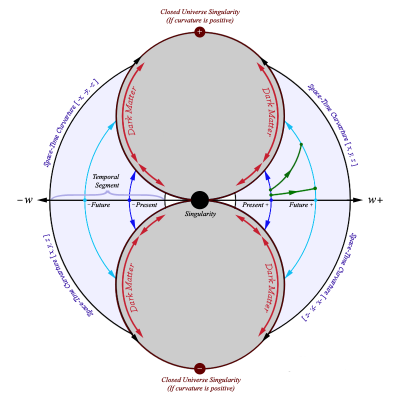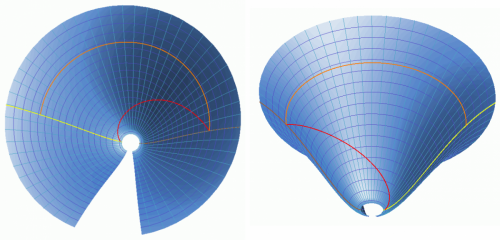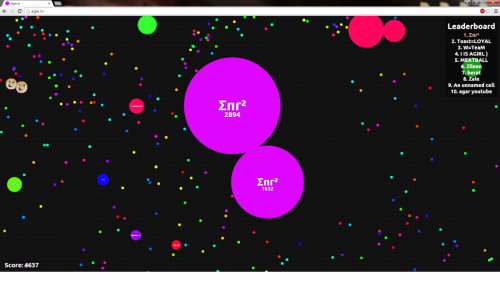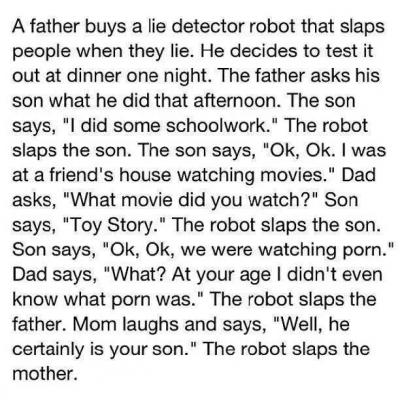There has been a lot of talk about the nature of time in the forums here lately. So, I'm going to try and answer these questions here in my thread on temporal uniformity. Before I can do this, I think it's important to bring everyone up to speed on how time is defined within the framework of temporal uniformity. I'm going to start from the beginning and make a series of falsifiable statements that I believe encompass the very nature of time itself. However, I have to apologize up front for such a long post, but it's necessary to introduce simple building blocks and go from there.
What is Time?
In order to understand the nature of time, we need to understand what it does and how it behaves. This requires making valid observations about time and its properties, and then construct a definition for time that encompasses these observations. So, let's list all of the observations we can make about time that we know are true.
We experience the passage of time as a duration, which is relative to the observer's frame of reference. Therefore, time is observed to speed up or slow down relative to various frames of reference.
Although the passage of time is relative to an observer, the passage of time is continuous. e.g. we don't observe objects disappearing and reappearing at different points in time because their clocks speed up or slow down.
We observe a clear direction through time such that we exist in the present moving towards the future leaving the past behind.
Although we experience a direction through time, we cannot see the dimension of time.
When plotting the path matter and energy takes through space, an extra variable is required to order events such as changes in position. In physics, we define this extra variable as time and we use clocks to measure it.
Because it is mathematically impossible for anything to move the space with an infinite speed, the act of changing position through space requires a duration of time. This is what it all boils down to in the end. This entire post is meant to emphasize this observation which demonstrates that time is a mathematical consequence of traversing distances through space at finite speeds. This will be the theme for my arguments regarding the nature of time.
I really can't think of anything else that we can say about time that is an actual observation, but there are a few preconceptions that we can list that fall right in line with surreptitious57's questions. These preconceptions usually revolve around time travel; the idea of being able to physically move through space-time in such a way that allows matter and energy to travel to the past.
Time might exist physically as a temporal dimension where matter and energy continues to exists along this dimension arranged the way it was in the past and will be arranged in the future.
Time might exist as some physical dimension that everything moves through, but only in one direction such that we could travel to the past if we could reverse our direction through time.
Time might exist according to the many worlds interpretation of quantum mechanics and there could be an infinitude of parallel universes that are defined by every possible event that can happen.
If time travel is possible, then temporal paradoxes are possible, and you could go back in time and kill your grandfather before your father was born. The paradox that I find most interesting is the one Michio Kaku mentioned about traveling to the past and killing yourself right before you time traveled.
Temporal Uniformity attempts to explain our observations of time and reconcile our preconceptions using a consistent mathematical definition for what time actually is. In doing so, we can explain all of our observations of time while demonstrating that time travel, as understood as the act of traveling to the past and interacting with matter and energy as it was arranged back then, is impossible. This frees us from temporal paradoxes, defines parallel universes which allow dark matter, dark energy, and dark flow to exist, and provides us with answers to some of surreptitious57's questions. We'll begin by discussing space and energy.
Space and Energy
In temporal uniformity, space is defined as a collection of points where each point is separated by some distance from each other and are organized along dimensions. Basically, it's just a metric space that is occupied by energy in all of its various forms. As will be demonstrated, there is no need to introduce some temporal dimension. However, we still need a way to order events, but we don't need time in order to do so. After all, there are really only two things the make up the universe; space and the various forms of energy that occupies it.
I think most people have this misconception that there exists some fabric of space that can expand or shrink. I could be wrong, but it seems more likely that what we perceive as expanding or contracting space is actually the result of how various fields that are generated by matter and energy affect the motion of matter and energy that traverses such fields. Furthermore, things like "quantum foam that is theorized to be the 'fabric' of the Universe, but cannot be observed yet because it is too small" and virtual particles that pop in and out of existence are the result of how energy behaves at different points in space and at different scales. If we existed as charged particles moving through a magnetic field, then the space around us would be defined by the shape of the magnetic field, which is definitely non-Euclidean. Of course, gravitational fields are very different than magnetic fields. However, both fields are generated by the energy contained within matter and both fields affect how energy moves through space. The important thing about these fields is that they change the metric of space for the energy that exists in it, which in turn affects how energy moves through it.
Regardless if space actually bends or not, once you define a metric space and introduce energy, there is only one thing that is physically possible; energy can now change position through space. After all, the only thing energy can do with respect to space is change position through it. Granted, energy can interact with itself and other forms of energy in several different ways, but it can only do so if it is allowed to change position through space and come into contact with other forms of energy in the environment. If energy could not change position through space, then no interactions could take place, and the universe would be forever static. Light wouldn't be able to traverse the vast distances between galaxies, and it would be impossible to perceive the universe because electrical signals in our brains wouldn't be able to traverse the neural pathways. The universe as we experience it can only exist when energy is allowed to change position.
Now, I need to introduce a point of clarity here for the sake of our experts, moderators, and everyone else. There has been much debate regarding motion when it comes to quantum mechanics (QM) where motion is not as easily defined. Most people assume that motion is simply the act of a solid body changing position through space such as a baseball. However, subatomic particles such as electrons do not behave as if they were tiny baseballs orbiting a tightly packed nucleus of protons and neutrons that are also like tiny sized baseballs. So, this idea of motion simply doesn't suffice to explain what is observed.
In order to resolve this discrepancy, we are forced to define motion simply as the act of energy changing position through space. After all, doesn't this encompass the very essence of what is observed at any scale? For example, when we look at standing waves or just waves in general, we see motion. However, it is not the same type of motion exhibited by a baseball.
Figure 1 - Wave motion.
Are the particles of the wave moving up and down creating the appearance that the wave is moving to the right, or are the particles actually moving to the right? How can we define the position of the wave? It's not like we can define a center point that allows us to track how the wave changes position like the baseball. Regardless of how complicated the motion is, we still know that the structure of the wave is in motion and its energy is changing position through space.
So far, we have defined the universe as being comprised of only two things; space and the energy that occupies it. Time has not been included in our definition for space because, as it will be shown later, it exists as a property of space and not as a separate phenomenon. We will define what time is but, for or now, let's recap the finer points discussed thus far.
The universe only consists of space that is occupied by energy in its many forms.
Motion is defined as the act of energy changing position through space.
If you agree with these statements, then the discussion can move forward. Now that we have defined space and energy, we need to discuss how we measure and quantify it.
Measurements
Whenever we take measurements, we can only do so by exploiting an attribute inherent to whatever it is we are measuring. For instance, space is composed of points that can be organized along spatial dimensions where each point is separated by some distance. One of the defining attributes inherent to space is distance separating the points within it. Without distance separating the points, there wouldn't be any space. So, the only way we can directly or explicitly measure distance through space is by using a predefined unit of distance. The unknown distance through space is quantified in multiples of this predefined unit of distance. Direction through space is also quantified using predefined units of distance along the dimensions of space defined by a coordinate system. Therefore, distance is an attribute that defines what space is and we can only directly measure space using a unit of distance. Just look at how we measure length, direction, areas, and volumes. All of these things that define what space is, are the result of measurements of distance.
The same is true for anything else we measure. We are forced to use mass to measure mass. Given a balance / scale and several unit masses, we can measure the unknown mass of some object. If we are measuring probabilities, then we are forced to take measurements of the number of times something happened in a particular way. No matter what it is we are measuring, we always have to use the thing we are measuring to take the measurement. Otherwise, it would be impossible to measure. The fact of this statement can be seen in our basic units of measurement such as feet, meters, grams, kilograms, etc... Each one defines a predefined unit of the thing we are measuring.
Now, you might argue that you can use measurements of time and speed to derive the value for the measurement of distance an object has traversed. However, such a value is implicit because it relies on measurements that are directly / explicitly taken of other physical phenomena that are plugged into an equation provided by a theory of ones choosing that defines how one or more of these explicit measurements relate to the value of the unknown quantity. The derived value of the measurement was not directly observed and relies on the accuracy and precision of the theory that defines such relationship. This provides further evidence that we can only use the physical phenomena itself to explicitly measure it. Let's recap.
In order to explicitly take a measurement of physical phenomena, you have to use the phenomena itself to take the measurement.
Values derived for measurements using equations defined by physical theories are implicit because the measurements were not directly observed and rely on the correctness of the theories that provided the equations.
Since we are forced to use the phenomena itself in order to measure it, we simply have to ask ourselves how we measure time. Understanding the mechanics that drives our measurements of time should reveal the very nature of time itself. Such an understanding should resolve temporal paradoxes, define the driving mechanism for change, describe relativistic affects such as time dilation, and explain the arrow of time.
Measuring Time with Motion
Why is it important to define and understand how we take measurements? How can we even begin to answer questions about time if we don't even understand the underlying nature inherent to time itself? It all comes back to the statement that In order to measure any physical phenomena, we are forced to use an attribute inherent to the phenomena itself. When we examine how we measure time, we find that we always use motion to take the measurement. A sun dial works because the Earth rotates, grandfather clocks works due to the swing of their pendulum, spring watches use a spring to turn gears, digital watches use electricity to cause crystals to oscillate, light clocks reflects photons between two plates, and atomic clocks measure quantum mechanical properties derived from the motion of the energy contained within atoms (I will address atomic clocks later in this post). The mechanism that measures time in all of these devices does so by some form of energy changing position through space.
If we can agree that we use motion as defined by energy changing position through space to measure time, then motion must be inherent to time. If motion is inherent to time, then time is purely spatial and is governed by distance, which makes sense because the only thing that exists in the universe is energy and space. Because it is mathematically impossible for energy to traverse distances through space with an infinite speed, the passage of time must occur. So, our experience of the passage of time is a mathematical consequence of motion being restricted to finite speeds and nothing more. This is no different than how objects seem smaller at greater distances. Such things are mathematical consequences of distance. Therefore, in temporal uniformity, time is defined as a mathematical consequence of energy changing position through space with finite speeds.
However, we measure motion as a change in space over a change in time. How can time be a consequence of motion if our definition for motion is based on units of distance and time? This contradiction can be resolved by analyzing how we use motion to measure motion. Because energy has to change position through space for change in the environment to occur, when we use a clock to measure the rate of change of a physical property, we are actually using the motion of the mechanism in the clock to measure the motion of the energy causing the physical property to change. In essence, we are using motion to measure motion no different than how we use distance to measure distance.
Besides, a change in position [math]\Delta\,x[/math] does not require measurements of time. The change in position is purely a spatial property which relates back to measuring distances. We introduced the concept of measuring time because energy can change position at different rates. However, we don't need measurements of time to measure these different rates at which energy can change position through space. All we need are measurements of the distance traversed for some unit of motion compared to the distance traversed by some form of energy. If this is true, then we should be able to remove the time variable [math]t[/math] from every equation in physics, and replace it with a measurement of distance. We can demonstrate this concept using a light clock.
Figure 2 - The light clock to the left is at rest and the clock to the right is moving relative to the observer's coordinate system.
The light clock to the left is stationary in the coordinate system or frame of reference (FoR) of the observer, and the clock to the right is in motion relative to the observer's FoR. For now, let's examine the light clock to the left that is stationary. There are only two ways to use the clock. We can either count the number of times photons have traversed the distance between the two reflective plates and define that measurement as a unit of time, or we can measure the distance the photons traversed between the plates. Both measurements are equally valid and allows us to quantify motion and order events.
[math]t = d_c[/math]
where [math]t[/math] equals a unit of time and [math]d_c[/math] is the distance traversed by the clock mechanism. Therefore, a unit of time is nothing more than a normalization of a unit of distance. If we choose to use measurements of distance, then we can define speed as the change in distance traversed by energy divided by the change in distance traversed by the clock mechanism.
[math]\text{speed} = \frac{\Delta\,d_e}{\Delta\,t} \ \ \text{or} \ \ \frac{\Delta\,d_e}{\Delta\,d_c}[/math]
where [math]\Delta\,d_e[/math] is the change in distance traversed by energy when the change in distance traversed by the clock mechanism equals [math]\Delta\,d_c[/math]. If the speed is constant, we could multiply the total distance our clock mechanism has traversed by our newly defined speed, and we can derive the distance the energy traversed through space without having to use units of time.
[math]d = \frac{\Delta\,d_e}{\Delta\,d_c} \times d_c[/math]
where [math]d[/math] is the calculated distance. Again, this is no different than measuring distance with a ruler. We are simply quantifying the distance traversed by energy in multiples of the unit distance traversed by the clock mechanism. So instead of measuring motion in units of distance per units of time, we are comparing distance to distance, which adheres to the rule that we have to use the phenomena itself to take measurements. The standard equation for motion using only measurements of distance is defined no differently than when we use values of time. So, we can completely rewrite every equation in physics that uses measurements of time to use measurements of distance instead.
[math]d = \frac{1}{2} \left(\frac{\Delta\,d_e}{\Delta\,t^2}\right) t^2+\left(\frac{\Delta\,d_e}{\Delta\,t}\right) t + d_0[/math]
[math]d = \frac{1}{2} \left(\frac{\Delta\,d_e}{\Delta\,d_c^2}\right) d_c^2+\left(\frac{\Delta\,d_e}{\Delta\,d_c}\right) d_c + d_0[/math]
As a result, measurements of time are the only units in physics that can be replaced by units of distance. Such a contradiction is a violation of dimensional analysis, which provides further evidence that when we use time to measure rates of change in physical properties, we are actually using motion to measure the motion of energy changing position. Again, let's recap.
There are only two measurements a clock can make; a measure of the number of times the clock mechanism has completed a cycle, or the distance the clock mechanism traversed throughout the cycle.
What we experience as the passage of time is the mathematical result of energy being restricted to finite speeds. Since it is mathematically impossible for energy to traverse space with an infinite speed, the passage of time must occur.
For any equation in physics, we can replace the time variable [math]t[/math] using measurements of distance.
Units of time become normalizations for units of distance and are interchangeable.
Although we can demonstrate that we use motion to measure time, there exists a different view regarding time that is based on change. That it is change that drives the mechanism of time. So, let's now discuss how change is propagated throughout space.
Change in a System
Newton said it best in his laws for motion. For every action there is an equal and opposite reaction, and an object will maintain a constant velocity unless acted upon by an outside force. Although these statements apply to the classical world of physics, they also apply to the QM world as well when we consider that the only thing energy can do within space is change position. If energy was not allowed to change position, then how could it interact with other energy in the environment? How could the window break if the ball did not change position through space, and how could we observe the ball breaking the window if the energy of the light emitted from these object is also not allowed to change position through space? The only observation we can make is that change in a system can only occur when energy is allowed to change position through space and interact with other energy in the environment. Thus, the very definition of interaction is energy changing position.
Because energy can change position through space, an organized collection of particles will become disorganized if the particles are allowed to move around freely. However, although physics allows it, we never see the disorganized particles reverse their motions and reorganize. So, we observe what we call the arrow of time. However, entropy and the arrow of time can be explained by energy changing position. Let's take our collection of particles and place them at the origin point of a coordinate system. Each particle in the collection has a defined position in that coordinate system, and the amount of disorder in the collection increases as the particles move farther away from their original positions. So, we could define the measure of entropy for the collection of particles as the total sum of each particles change in distance from its original position in the collection. If all the particles were at their original position, then measure of entropy would be zero. As entropy increases, the particles move farther away from their original position. However, this doesn't explain the arrow of time. To understand why smoke doesn't go back into the cigarette or why an ice berg doesn't jump out of the water and reform the glacier, we only have to examine the physics of a single particle.
In order to set the particle in motion, we have to apply some amount of energy [math]E_1[/math] to it. Now that the particle is changing position, the disorder or entropy of the collection of particles is increasing. To stop entropy from increasing, we have to apply the same amount of energy [math]E_1[/math] to bring the particle to rest. However, the entropy of the collection of particles is still higher than it was before we applied energy to the particle. In order to reverse entropy and restore the collection of particles to its original form, we have to apply some energy [math]E_2[/math] to the particle to reverse its motion. Then, we have to apply the same amount of energy [math]E_2[/math] to bring the particle to rest at its original location restoring the collection of particles to their original state. Therefore, it takes more energy to restore the collection of particles to their original state than it does to increase its entropy.
The amount of energy needed to set a single particle in motion and increase the entropy of the collection of particles is
[math]\text{increase entropy} \rightarrow E_1[/math]
The amount of energy needed to reverse the motion of the particle and lower the entropy of the collection of particles is
[math]\text{reverse entropy} \rightarrow E_1 + 2 E_2[/math]
Because the amount of energy needed to increase the entropy of a system is less than the amount of energy needed to restore the system to its original state, the collection of particles will continue to become disordered and the arrow of time is observed. So, although physics allows for these particles to reorganize themselves, it takes more energy to restore a collection of particles to their original form than it does to cause them to become disordered. This is why the arrow of time seems to move in only one direction,
Entropy and the arrow of time are caused by energy changing position through space.
It takes more energy to organize a collection of particles than it does to cause them to be disordered.
The only thing various forms of energy can do as a result of interacting with other forms of energy or itself is to change position through space such that change in the environment can only occur when energy is allowed to change position through space.
So, even entropy and the arrow of time can be explained by energy changing position, but we still need to consider atomic clocks. After all, they are based on QM where the motion of energy is not so easily defined.
QM and Motion
I believe the biggest confusion regarding QM for most people is what we are actually measuring when we apply energy to a quantum mechanical system. Because we cannot physically see these subatomic particles such as electrons, we cannot directly measure how energy within the system is changing position. Instead, we attempt to detect their position in space by using some form of energy to interact with these particles or fields. Then, we determine the position where they occurred along with how many times we were able to detect the particle at that position. This allows us to build a probability space of where the particle occurs and the probability that you will find it at any given position in that space. The following image demonstrates these atomic orbitals, which "can be used to calculate the probability of finding any electron of an atom in any specific region around the atom's nucleus."
Figure 3 - False-color density images of some hydrogen-like atomic orbitals (f orbitals and higher are not shown). (Wikipedia atomic orbitals)
Measurements in QM such as those taken for quantum numbers or quantum fields are completely different than measuring how the energy contained within these particles or fields is changing position through space as defined in the classical sense. QM deals with aspects of energy that can't be explained using classical mechanics.
However, QM behaviors occur within space and must be caused by energy changing position and interacting with energy in the QM system / environment. As defined earlier, the only thing energy can do within space is change position. Granted, energy takes on many forms where each form has special properties that cause different forces to be generated that in turn affect the motion of energy in the QM system but, despite the cause that set it in motion, the only thing energy can do as far as space is concerned is move through it, which allows energy to interact with the environment.
Even if we never learn how energy within these particles or waves is changing position through space, how could change in an atom or particle occur if energy wasn't allowed to change position and interact with other energy within the system? Just because we don't know or can explain how this energy changes position doesn't mean that motion does not occur within QM systems. Furthermore, force is propagated in QM through force carriers. If the energy contained within these particles was not allowed to change position through space, then the universe would not be able to exist much less use them to take measurements of QM systems.
An argument was made that we cool the atoms in atomic clocks to near absolute zero as to eliminate motion from the QM system, and yes this is somewhat true. However, it is not an honest argument. We don't super cool the atoms to eliminate the motion of the energy in the atoms. We super cool the atoms to eliminate the motions of any energy within the environment that would interfere with the motion of the energy contained in our atoms. Then, when we use energy to interact with these atoms to create atomic clocks, we can measure the QM affects that result from the energy changing position within the atoms themselves. We may never know how the energy within atoms is actually changing position through space in a classical sense but, because energy has to change position through space to interact with other energy in the system, we observe QM properties that are a result of such motions. Our entire existence occurs because energy changes position through space.
Measurements of quantum numbers, fields, and other QM effects are not the same as measurements of energy changing position through space.
QM effects arise when energy changes position through space.
Energy contained within atomic clocks must change position through space for the clock to work.
Because we can't measure how energy in atomic clocks change position through space, we have to count the number of times some quantum number completes a cycle.
I realize that my argument for QM might be considered weak. However, if we agree that the universe is comprised of space and the energy that occupies it, then the only way change can propagate is by energy changing position through space, which includes QM systems.
I would also like to add that even though quantum teleportation seems to allow information to traverse distances through space instantaneously, energy must still be allowed to change position through space for it to work.
I figured this additional statement was required to make because I can see someone arguing this point.
Temporal Uniformity
So far, we have explained a few of our observations of time:
We experience the passage of time as a duration, which is relative to the observer's frame of reference. The passage of time occurs because energy cannot move through space with an infinite speed.
We observe a clear direction through time such that we exist in the present moving towards the future leaving the past behind. It takes more energy to restore a collection of particles to their original arrangement than it does to cause them to become disordered.
When plotting the path matter and energy takes through space, an extra variable is required to order events such as changes in position. Instead of measurements of time, we can now use measurements of distance when plotting that path energy takes through space and to order events.
We still need to explain why time can speed up or slow down, why we don't see a dimension of time, and how we can resolve temporal paradoxes by removing the temporal dimension of time altogether. In order to do this, we have to discuss how four spatial dimensions can be used to describe how we experience time including relativistic affects such as time dilation and length contraction.
Temporal uniformity states that the universe consists of four dimensions of space where the energy contained within this space is moving away from a single point at the speed of light where the big bang event occurred. Once the energy from the big bang cooled enough to form matter, this matter became trapped in a manifold of space defined by the boundary of a 3-sphere or four-dimensional sphere that is radially expanding at the speed of light. The reason why matter and energy is bound to a 3-sphere is because the energy that formed this matter started its journey moving away from a four-dimensional point in space at the speed of light where the big bang event occurred. Because matter and energy is moving at the speed of light along a radial vector of a 3-sphere, we can only observe light that moves in the three remaining dimensions that are perpendicular to these radial vectors. So, this three-dimensional boundary of this four-dimensional sphere becomes the space that we and everything that is observable exists; essentially our view of the universe. Figure 4 illustrates a two-dimensional cross-section of a four-dimensional sphere with the observer [math]O_b[/math] located at the coordinate where the big bang event occurred and the observers [math]O_n[/math] and [math]O_r[/math] located on a boundary defined by the four-dimensional sphere.
Figure 4 - A two-dimensional cross-section of a 3-sphere with three observers defined at various locations.
This view of space and the energy that occupies it gives us a natural explanation for why we observe the space in between galaxies expanding. It also explains why space is expanding everywhere with no observable center to the expansion. We simply can't see the center to this expansion because it exists in four-dimensional space.
However, it's not space or time that is moving or expanding. Instead, it's the energy radiating away from a four-dimensional point at the speed of light that is causing the observers [math]O_r[/math] and [math]O_n[/math] to move away from each other with a velocity [math]V_r[/math]. Although this provides us with an explanation for how space can expand, it doesn't explain the acceleration that is observed, or provide us with an explanation for gravity. However, the affect of the expansion for this 3-sphere is numerically identical to the "bug on a band" problem. The following is from a post I made in the thread, "Is Krauss looking at this right?".
"Two views of an isometric embedding of part of the visible universe over most of its history, showing how a light ray (red line) can travel an effective distance of 28 billion light years (orange line) in just 13 billion years of cosmological time. Click the images to zoom. (Wikipedia)"
The point I was making in the quote is that if space is the rope and it stretches in accordance with the ΛCDM scale factor and we think of the ant's speed as the speed of light, then this analogy is numerically accurate to the observed expansion of space. Therefore, the concept that we are bound to a 3-sphere that is expanding at the speed of light through four-dimensional space fits within our current framework of physics.
So, in order to explain dark matter, dark energy, and dark flow we have to expand upon the idea of being bound to a 3-sphere in four-dimensional space, which we will do later in the section on Space, Gravity, and Time Dilation. The reason why it is important to introduce this into the discussion is because it provides us with a mechanism that explains why we can't perceive four-dimensional space directly and allows us to explain gravity and gravitational time dilation. As explained above, since we are bound to a 3-sphere that is expanding radially at the speed of light, we can only see light that moves along dimensions of space that are perpendicular to radial vectors that comprise the 3-sphere. Thus, we cannot physically see this four-dimensional space, and can only observe how it affects energy as it moves through it.
Furthermore, if we consider that the energy of the big bang event didn't radiate away from this four-dimensional origin point all at once, there would exist layers of 3-spheres each expanding radially at the speed of light that contain their own matter and energy. Each layer would be a separate universe altogether, but each layer would still exist in the same four-dimensional space and potentially interact with each other through gravitational fields. Because each layer has a radial velocity that is zero relative to the radial velocity of other layers, matter and energy within these other layers could still affect each other gravitationally. However, because each layer has a radial velocity equal to the speed of light relative to the four-dimensional point in space where the big bang event occurred, the gravitational affects of each layer could only affect matter and energy along dimensions that are perpendicular to radial vectors that comprise the 3-spheres. Because matter and energy within layers along the outermost edge of the expansion of the big bang are moving away from each other with a greater velocity [math]V_r[/math] than the inner layers, these outer layers would pull the matter and energy within the inner layers along with it. This not only explains dark matter, but also provides a mechanism for dark energy, which would also be observed as dark flow. Figure 5 illustrates these layers as three-dimensional spheres.
Figure 5 - A three-dimensional representation of the universe demonstrating various layers defined by the surface of the spheres that contain individual local views of space.
Figure 6 illustrates how these 3-spheres are comprised of matter and energy, and how dark matter and dark energy can be represented as different 3-sphere layers.
Figure 6 - A two-dimensional cross-section of four-dimensional space showing how dark matter existing at different layers or 3-spheres can give rise to dark energy and dark flow.
Some of you might disagree with this view space and time because we are taught that anything with mass cannot move at the speed of light. However, when we use special relativity to derive our four-velocity through space-time for an object at rest, we find that the magnitude of this four-velocity is equal to the speed of light.
Now that we have defined space as being four-dimensional, and that matter and energy moves through this space at the speed of light restricted to the boundary of 3-spheres, we can explain why time dilates. This has nothing to do with some actual physical dimension of time. Instead, it relates back to how energy can only traverse distances through space at finite speeds. If the metric of space changes how distances are traversed, then naturally clocks will measure time differently based on an observer's FoR.
Space, Gravity, and Time Dilation
If we consider that time is just a property of space that is a consequence of energy moving with finite speeds, then it becomes easy to explain time dilation.
Figure 7 - The light clock to the left is at rest and the clock to the right is moving relative to the observer's coordinate system (figure 2 revisited).
If we examine the light clock on the right that is in motion relative to the observer's FoR, we will notice that the path the photons have to traverse between the two plates has been elongated. Because the speed of light is the same for all observers, the observer at rest relative to the clock in motion will notice that the clock ticks more slowly. The tick of the clock doesn't change because it moves through time slower than the observer. The tick of the clock changed because the metric of space has changed causing distances to be affected. The path that the photons have to traverse has been elongated, which affects how the energy of the photons changes position through space. It's as simple as that. There is no special temporal dimension where the clock is moving slower than the observer.
In order to understand gravity, we have to understand that what we observe in the universe is actually a three-dimensional projection of matter within four-dimensional space. Because energy is moving away from a four-dimensional point in space at the speed of light in all directions (where the big bang event occurred), we lose the ability to perceive light along our local radial vector of space. So, if the universe was three-dimensional, and we were bound to the surface of a three-dimensional sphere that was radially expanding at the speed of light, we would only perceive the universe as having two-dimensions as defined by the surface of the sphere. However, the universe would still consist of three dimensions of space. As previously discussed, when we apply this concept to four-dimensional space, we end up with three observable dimensions of space.
Now, as objects gain mass they slow down as a result of conservation of momentum. This is also applies to motion through four-dimensional space. However, objects that gain mass don't seem to slow down along the radial vector of expansion and fall outside of the boundary defined by the 3-sphere and completely disappear from our local view of the universe. You can think of this no different than cars moving down the highway at different speeds. Eventually, cars that are moving slower down the highway will disappear from the view of cars moving faster. So, we are forced to expand upon the concept of being bound to a 3-sphere that is expanding radially at the speed of light because just defining a boundary that arises as a consequence of the speed of light isn't enough to explain how conservation of momentum plays its part and why objects with mass simply don't vanish from this boundary.
To explain why matter and energy remains bound to these 3-spheres, we have to speculate that these layers that were formed by matter and energy moving away from a four-dimensional point in space at the speed of light where the big bang event occurred is more than just a result of speed. Instead, if we consider that most of the energy from the big bang event is in the form of gravitational waves, then we can consider that this boundary defined by 3-spheres are actually gravitational waves that formed when the big bang event occurred. Therefore, not only do these 3-spheres arise from matter and energy moving at the speed of light away from a four-dimensional point in space, but that most of the energy contained within these layers is in the form of four-dimensional, spherical, gravitational waves.
If we can consider this speculation, then we can explain why objects with mass don't disappear from our own boundary defined by the 3-sphere, and we arrive at a natural explanation for gravity and gravitational time dilation. First of all, due to the law of the conservation of momentum, as objects gain or lose mass its speed will change along all dimensions of space. This includes the higher four-dimensional space that, as explained previously, we can't physically see. However, if these layers defined by the 3-spheres are also gravitational then, as objects gain mass or energy, they will attempt to slow down along their local radial vector. However, instead of completely moving outside of the boundary defined by the 3-sphere, they can only move so far until this extra mass / energy is countered by the gravitational field that is defined by the 3-sphere itself. As the objects gain mass, they can only move so far until the field counters this motion and continues to carry this matter and energy along with the expansion. So, instead of a smooth boundary as defined by the 3-sphere, it's more like the surface of a golf ball where the dimples represent the displacement of objects with mass relative to the smooth boundary of the 3-sphere itself.
Figure 8 - Gravity as demonstrated from a two-dimensional space that exists in a three-dimensional universe.
As figure 8 illustrates, if we existed on the two-dimensional surface of a three-dimensional sphere that is expanding radially at the speed of light, then objects with mass would create an impression in the higher three-dimensional space the comprises the universe. This causes an elongation of distances when observed from the higher, three-dimensional space as can be seen in figure 8. However, we cannot observe this higher dimension of space because we are moving at the speed of light along our radial vector from the center of the sphere to the point we are located. The means that we can only see light that is perpendicular to this radial vector. Although the true distance through the higher dimension of space is the length of the green curve from the points C to D, we'd only perceive the distance through space as the orange line from the points A to B. To us, it would appear flat.
This distortion of distance in higher dimensional space, is why gravity and gravitational time dilation exists. As an observer moves along the green path starting from point C moving towards the massive object in between C and D, for every unit of distance the observer traverses in the two-dimensional space, the distance traversed in the higher three-dimensional space increases. Although we can't see this higher dimension of space, the observer would still be traversing greater and greater distances for each unit of distance traveled in the two-dimensional space. This is why the observer experiences the force of gravity. The distance in the higher dimension of space is actually increasing for each unit of distance traversed within the two-dimensional manifold, and it is this effect that causes clocks to tick more slowly in gravitational fields. No different than distances being elongated for the light clock that is in motion relative to the observer, the distances as observed in the higher dimensional space is being elongated by the gravitational field and causing the clock to tick more slowly.
Again, none of this has to do with the existence of some physical dimension of time that we call the temporal dimension. Instead, time dilation, gravity, and gravitational time dilation can all be explained by changes in the metric of space that causes distance to contract or expand, which in turn affects the distance the mechanism in the clock has to traverse in order to measure time. It's as simple as that, and we don't have to invoke some temporal dimension to measure time and order events.
The Nature of Time
When we apply this concept to four-dimensional space, we can explain why we perceive the universe as having three spatial dimensions while experiencing time. However, we do not need to invoke some physical temporal dimension where energy exists as it was in the past or as it will in the future. When we consider that time is a mathematical consequence of energy traversing distances through space at finite speeds, then the only way one can "time travel" is to physically arrange all of the matter and energy to the way it was in the past or how it will be arranged in the future, which is physically impossible.
When our equations, such as those in general relativity, give us a negative change in our time variable [math]t[/math], we don't have to interpret this as a way to travel back in time. The view as provided by temporal uniformity suggest that instead of traversing some temporal dimension, that we are really traversing the higher, four-dimensional space that comprises the the universe such that we end up at a point in four-dimensional space outside of the boundary as defined by the four-dimensional sphere or 3-sphere that comprises our local three-dimensional view of the universe. In the case of wormholes, we'd just end up in a different three-dimensional space defined by a completely different 3-sphere. The matter and energy located in our manifold of space would still be expanding outward with the rest of the layers and you'd simply end up in a different layer.
So, using the framework of temporal uniformity, we can now answer some of surreptitious57's questions.
Time is a mathematical consequence of matter and energy being restricted to changing position through space at finite speeds. It's simply impossible for anything to traverse space with an infinite speed, which is required in order to change position without any duration of time to be experienced. We perceive the universe because electrical signals in our brains traverse the distances that separate our neurons. If these electrical signals could traverse the neural pathways with infinite speed, then our brains could process every single piece of information received from the environment and we could have every single thought instantaneously. If the electrical signals in our brains traversed the distances along our neural pathways with infinite speed, then they could traverse these pathways an infinite number of times before any amount of time would pass. The result of this would be as though time stopped.
So, at least within temporal uniformity, time is not a dimension at all and, as demonstrated earlier, we don't even need measurements of time in order to formulate the laws of physics or order events. Because points in space exist regardless if time is defined or not, the energy that occupies space can change position within it. The result is the occurrence of motion, and it is the motion of energy through space that causes change in the environment to occur. Therefore, matter and energy can only move through space because time does not exist as a physical dimension all by itself or even as a part of space. Time is nothing more than a mathematical consequence of distance.
As explained in the section, Change in a System, the arrow of time occurs because it takes more energy to restore a collection of particles to a particular arrangement than it does to cause the collection of particles to become disordered.
The amount of energy required for entropy to increase is
[math]\text{increase entropy} \rightarrow E_1[/math]
where the amount of energy required to reverse entropy is
[math]\text{decrease entropy} \rightarrow E_1 + 2 E_2[/math]
In the section, Temporal Uniformity, we demonstrate how space can expand naturally without having to invoke some fabric of space that is expanding itself. The effect is best illustrated in the following image.
Although we didn't discuss black holes, we did define how gravitational fields affect the metric of space causing distances to expand or contract. If distances become elongated, then the mechanism inside a clock that uses motion to measure time will tick more slowly. Time dilation occurs because the metric of space changes how distances are defined and, even if we can't perceive this contraction or expansion of space as is the case for gravitational fields, the effect arises because distances are affected. Because relativity theory has shown that the speed of light is the same for all FoRs when measured using the same units, then energy itself and not just clocks is affected by this contraction or expansion of space. So, not only do clocks tick more slowly, but energy itself has to traverse distance for change in the environment to occur. So, observers / people will also age more slowly when placed within gravitational fields relative to observers / people outside of theses fields.
However, just because physical processes are affected by the elongation or contraction of distances within or outside gravitational fields doesn't mean that these processes are literally moving slower or faster through time. Sure, people will age differently when observed from varying FoRs, but this effect is purely spatial. That is why my theory is called temporal uniformity. Although we can experience time differently, we still remain temporally uniform as energy changes position through space. In other words, we don't observe object disappearing and reappearing because clocks slow down or speed up.
From the FoR of a photon, if such a thing could be said, time could not be measured at all. Take a look at the light clock to the right that is in motion relative to the observer.
As the speed of the clock approaches the speed of light relative to the observer, the path that the light has to traverse increases more and more. If the clock was allowed to travel at the speed of light, then the path the photon's have to traverse between the reflective plates becomes stretched to infinity. Therefore, it would be impossible for such a clock to measure time.
As for the question, "Has time always existed?", I believe the answer depend on if space has always existed. Although my reply to this is pure speculation, I believe that space and energy has always existed because energy cannot be created or destroyed. So, I believe that space had to exist in order for energy to fill it. If we consider the universe as described by temporal uniformity, not only can we define the big bang resulting in multiple layers of 3-spheres that represent separate three-dimensional universes, but also multiple big bang events that can occur throughout this physical four-dimensional space.
So, not only have we defined time within the framework of temporal uniformity beyond the simple definition of that which clocks measure, but we also have derived a definition that encompasses all of our observation of time while demonstrating that our preconceptions regarding time travel are wrong. Sure, there are some speculation on my part, but these speculations fit within our current framework of physics. To demonstrate this I'll will re-post the mathematics I derived that uses the equations of special relativity for time dilation to derive the notion that we traverse four-dimensional space at the speed of light.
Thank you for reading this post. I hope that I have clarified, at least within the framework of temporal uniformity, what time actually is. In doing so, we have resolved temporal paradoxes by showing that time travel is impossible, provided explanations for the multi-verse and how dark matter, dark energy, and dark flow exists within our four-dimensional universe, and have defined a consistent definition to explain time.


